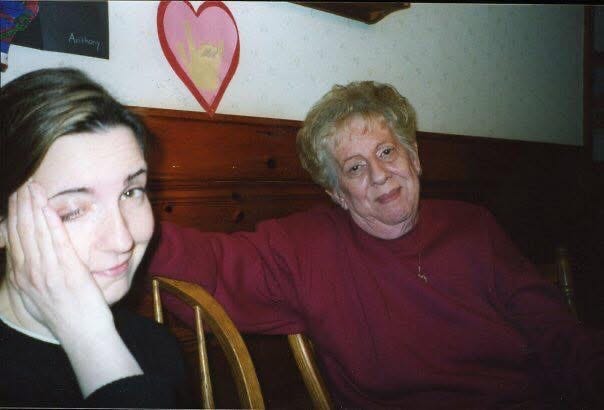Sixteen years ago today, I was driving to the hospital where my mother was in hospice care, dying from congestive heart failure and a host of other health issues. I hadn’t even gotten on the Garden State Parkway when my sister called to tell me our mother had passed away that morning. I’ve always believed loved ones leave this world when particular people are in the room. When my mother-in-law passed away from ovarian cancer in 2005, my husband and I saw her take her last breath. It was peaceful and spiritual. My mother would’ve never wanted me in the room with her when she died. We had a complicated relationship, so in a way, I understood why my sister was in the room when it happened.
As I’ve grown older, I’ve begun to understand my mother in ways I couldn’t have in my late 30s (I was 37 when she died). As the youngest of four children, my mother grew up under the strict Italian regime of my grandparents during the 1930s-1950s. She was a softball star in high school and was being recruited; my grandfather forbade her to play after she graduated. She had dreams about going into fashion merchandising. Instead, her parents forced her and her two sisters to get sensible full-time jobs so they could contribute to the tuition of their brothers—my uncles—to attend medical and pharmaceutical school, respectively. I never thought about how soul-crushing that must have been for my mom until some of my dreams fell apart. She taught me to pick myself up and keep going, no matter how hard things feel.
When I was little, I’d sit in the bathroom as my mom got ready for work: hair, makeup, a great outfit, perfectly manicured nails, and perfume. Today’s beauty culture is filled with landmines, but in the late 1970s and early 1980s, my mom gave me this advice: “No matter how you feel on the inside, get out of bed, take a shower, put on a good outfit, and look pretty.” Anyone who knows me well can tell you that I love clothes and beauty products, go for regular blowouts, and always have manicured nails. I work from home, so I do these things because they make me feel good. My mom was right.
Some people who know me well might also tell you I am “tough.” I’m not mean—that’s not part of my wiring—but I am no-nonsense. I don’t respond well to passive-aggressive people, and I am, as someone once put it, “not so subtle” when I don’t like someone or something. My daughter and sister often make fun of me because I could be in the worst mood but get on a call and act like a ray of sunshine. I credit my mom for this talent: she was soft as needed, but you did not want to mess with Toni Matthews, especially regarding family.
My daughter was only eight months old when my mom died. I took her to see her grandmother a couple of times, and thankfully, I have one photo of them. I know my mom would adore my daughter in ways she couldn’t act with me. I was close to my dad because my mom and I bucked heads. We were too much alike, so everything was a fight. She didn’t know how to talk to me; she didn’t know how to open up emotionally; she suffered from depression. When I was in college, the distance between us grew so much that we barely spoke. I did so alone when I was engaged and shopping for wedding gowns. This insulted my mother, so I took her to the boutique where I found the gown I wanted to purchase. I assumed she’d help me pay for it. When we were at the counter while the sales slip was being completed, I looked at her and said, “Thank you for doing this.” She snapped back, “For doing what? I’m not paying for this.” She took an envelope from her purse filled with $100 bills and reluctantly gave me one as a down payment for the dress. I paid for the rest using the boutique's payment plan (for the record, the dress wasn’t that expensive). This incident, and others leading up to my wedding, put a wedge between us that never disappeared. When I found out I was pregnant with a girl, I promised myself that I would nurture her, be there for her, and never make her feel the way I did in that boutique: alone.
After my father died, my mom was only concerned about herself. She never asked my siblings and me how we managed without our dad (horribly, thank you). She sunk into a deep depression, rarely left the house and allowed my late brother, who was in the throes of addiction, to rob her blind when he was supposed to be taking care of her. It wasn’t until I showed up unannounced that I discovered the apartment was in shambles, jewelry was stolen, and she had signed blank checks so my brother could take whatever he wanted from her bank account (my brother was her favorite by miles). Part of me felt compassion, but the other part was enraged that she didn’t care anymore. I knew she wanted to be with my father, so it wasn’t surprising when her health deteriorated. My brother disappeared, my sister tried hard to help our mom, and I juggled a baby, a toddler, and a full-time job while visiting her as much as possible.
One day, not long before she died, my mother looked at me and said, “I love you because you are my daughter, but I don’t like you.” I laughed and said, “I don’t like you very much, either.” It was the most honest we had ever been with each other. I knew she didn’t like me—that was clear when I became a teenager. She was jealous that I was close to my dad and resented me because I got to live my life without the restrictions she was subjected to. I never got to tell her that she taught me I could be a working mother or thank her for allowing me to stay in the kitchen while she made meatballs and gravy every Sunday (I now make it from memory). I’ve unpacked a lot about my mother in therapy, which has helped me see that she was a product of her environment—and her environment wasn’t great.
I know that as we grow up, it doesn't occur to us very often what our lives will look like when our parents are gone. Sometimes, we only see them when they annoy us in the here and now, and we can't stand to listen to them for another second. I know that even in the more complicated relationships with parents, their absence is acutely felt during the bright spots in life. I also know that when they are no longer physically present, they leave signs for us when we need them or least expect them. When you leave your heart open, you see them. Whenever I see a monarch butterfly or cardinal, I know it’s my mom checking in. I usually smile and say, “I’m okay.”
A photo that perfectly encapsulates our relationship:





This is both heartbreaking and beautiful. And so honest. Thank you for telling it like it is, and was, with such remembered pain, compassion and clarity. (And...that photo! omg!) xo
Thank you for this. When people say that time is the great healer I want to wallop them. Time doesn't heal, nothing does. Instead you learn to live with the constant low buzz in the background that can eventually -- but not always -- lead to understanding.